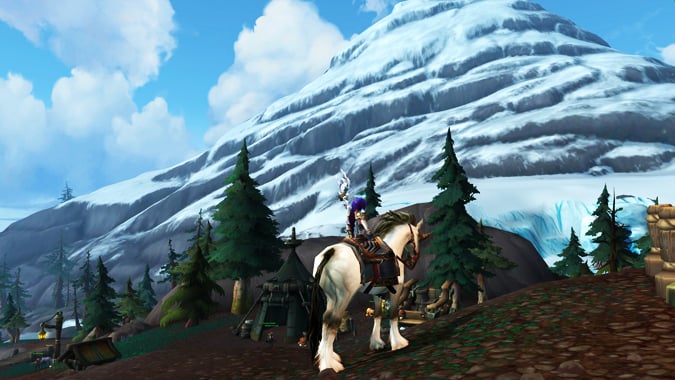The Queue: Existence ought to be weird

Can I get personal for a minute?
One of the downsides since launching Blizzard Watch is that I have less time to write and interact with the community (beside Twitter)… no time for podcasts, lots of other posts, etc… And that means I don’t get to (friendly) argue with Matt Rossi anymore. And because of that I spent a couple hours this morning writing a reply to a question that wasn’t really asked … just for Matt.
Let us Queue.
I understand why factions are at war again. I don’t understand why the player character would participate in said war. We spent all of Legion becoming friends with and helping members of both factions. We trusted each other with our lives and memember of the opposing faction followed me as their leader following my command and in some cases even acting as my personal bodyguard. Why would I want to kill them all of the sudden? A perfect example is the exodar scenario. I pretty much have single handedly saved the exodar in Legion. Why would I want to destory it in Bfa?
This is a very common sentiment and was even expressed as far back as Classic WoW when the factions partnered up to open up the AQ gates (but then were at war again). The refrain from Blizzard storytelling seems to be rather consistent: the factions don’t like each other very much at the macro level, and each time peace is thought to have occurred between the two something happens to disrupt it.
This concept isn’t necessarily that out of sync with reality. The US and Russia have been “at peace” for a long time, but the relationship has its ups and downs, sometimes through proxy wars, other times through direct action. At the individual level I don’t know that I’ve met any Russian I don’t like. But at the macro level our countries seem to have some fundamental differences. This real-world micro/macro distinction has played out most famously in World War I’s Silent Night.
So while I think the story is a bit rusted at this point in the WoW universe, I think a bit more obvious (instead of the subtle) reference to the fragile peace concept throughout the story going forward would explain this better. What Blizzard is doing though is not inconsistent with reality. What I do think is inconsistent is the way it’s explained and woven throughout the entire tale of the current iteration of WoW.
Which leads me to that WoW 2 piece I’ve been working on forever and a day…
Are there herbalism and mining trainers in booty bay or do I have to go all the way to undercity?
Don’t go to Undercity, just jump on a ship to Ratchet and fly to Orgrimmar. Quick five minutes or less to get it.
So, what are the chances my connecting flight in Minneapolis gets canceled tomorrow and I have to spend the night at a friend’s house? 90%? 95%?
You asked this on Friday, so I’d say you were probably stuck.
I live in Maple Grove, a suburb of Minneapolis, and we got about 16″ outside of my townhome. I have no words for what just happened to the Twin Cities, other than I think we must have upset Thor or some long lost god of large things.
There was even thunder snow. Multiple times.
I feel the worst for the poor guys the HoA contracted to clean up this mess… there have been shifts working around the clock. I did give one of the guys a beer though. Because damn does everyone need it after this weekend.
“Existence is weird” — Queue title for April 13th.
Let’s talk about this word for a minute. Oxford English Dictionary defines existence as “The fact or state of living or having objective reality,” while it lists the origins as “Late Middle English: from Old French, or from late Latin existentia, from Latin exsistere ‘come into being’, from ex- ‘out’ + sistere ‘take a stand’.”
Knowing you as I have for the past decade and change, I realize this is mostly given in a lamenting state. Not that such a lamentation is wrong, unwarranted, or undeserving of begin written and told, mind you, but still I feel it was said in a response to the very life we all lead and have to deal with in one way or another. So let me base my first reply on the premise that existence being weird is not in fact the way that existence should reveal itself to a human.
If weird is taken to be the result of abnormal actions or being, then I would content that such abnormality is but a result of a power system setup around the definition of abnormal vs normal. There is the normal existence, defined by those in power (which as I type this and revisit the idea of abnormality for the first time in a while, I now find disgusting who is actually setting that definition these days), which is the antithesis, of course, by what they desire to be normal. This structure appears to change rapidly since the concept was fully explored by my oh-so-favourite intellectual, and in so much in that rapid change and redefinition of the word happens I would contend that the abnormal, non-structural existence state of being “weird” is exactly where one with substantial character should be these days. “Keep Portland Weird,” as the colloquial goes.
In my second reply, let’s assume the opposite, that you’re stating existence is weird in such a way that it confirms our very being and affirms the purpose of life. The ontological impression here is that our state of abnormality is not a property of an object (such as a chair or individual) — that it is not you or I who is weird, but existence itself. Kant’s Critique of Pure Reason agrees that the state of existence (and being) is not tied to an object itself but instead of a concept: “Thus when I think […] what would exist would not be the same as what I had thought in my concept, but more than that, and I could not say that the very object of my concept exists.” Hume, Russell, and many others agree (more or less). I would contend that if existence is not tied to an object itself but instead to metaphysical concept, then the act of existing cannot be appended to be normal or abnormal, it just is. Existence, as one of its two states of being, ought to be weird.
In both cases I have established two separate but compelling criteria why existence ought and should be weird:
- The flawed masters of the normal necessitate an abnormal (weird) existence
- In agreeing with Hume and Kant that existence is not a property of an object, but instead an axiom of the universe itself, the state of being normal or weird, each being equally valid
And finally, I miss getting into esoteric debates with you on the podcast, Matt. They were fun.
Please consider supporting our Patreon!
Join the Discussion
Blizzard Watch is a safe space for all readers. By leaving comments on this site you agree to follow our commenting and community guidelines.
 @adamholisky
@adamholisky




